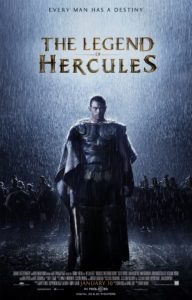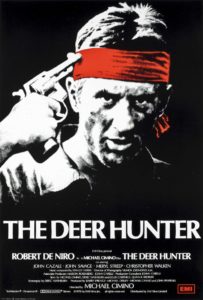HNC Photography, IFC - Coursework, Introduction to Film Culture Blog, Part four - Rites of passage, Project 1 - Immortal combat
“rite of passage”
noun
-
a ceremony performed to facilitate or mark a person’s change of status upon any of several highly important occasions, as at the onset of puberty or upon entry into marriage or into a clan.
-
any important act or event that serves to mark a passage from one stage of life to another.
Rites of passage are theme that run through many movies; however, they are very prevalent in film from a mythological nature, for example, The Legend of Hercules (Dir Renny Harlin, 2014) or one of my favourites Jason and the Argonauts (Dir. Don Chaffey 1963) and within films set at a time of conflict such as the The Deer Hunter (Dir. Michael Cimino 1978) and recently Hacksaw Ridge (Dir. Mel Gibson 2016).
 Mythological films tend to feature a traditional masculine hero, are heavy patriarchal in nature and the female characters can often be little more setting dressing being portrayed as stereotypically feminine. While The Legend of Hercules is, in many ways a modern film, telling the story of Hercules as an origins story still falls firmly into the hyper-masculine, patriarchal world of the mythological film of the 50’s and 60’s.
Mythological films tend to feature a traditional masculine hero, are heavy patriarchal in nature and the female characters can often be little more setting dressing being portrayed as stereotypically feminine. While The Legend of Hercules is, in many ways a modern film, telling the story of Hercules as an origins story still falls firmly into the hyper-masculine, patriarchal world of the mythological film of the 50’s and 60’s.
Hercules is a demi-God, son of Zeus and mortal woman portrays the classic hyper-masculine behaviours of the traditional military hero. The other male characters also exhibit this hyper-masculine trait, particularly Amphitryon (Hercules stepfather) who in the is shown reacting violently went ever his masculinity is challenged. The female characters within The Legend of Hercules tend to exhibit stereotypically feminine, behaviours and are of course always portrayed as visually and sexually attractive.
The film is very linear in its progression, it is clearly obvious from the beginning of the film; how the film will end and this is not because the story of Hercules is so well known. It is a pure good versus evil tale, where the progression is the hero coming to terms with his lineage and destiny and if not literally follow in his father footstep, at least follow the path set out for him by Zeus and become the hero of his people and of course win the girl. The traditional happy ending
 In contrast, if we look at the flawed masterpiece of 1970’s cinema, The Deer Hunter, we have seen on the surface the same hyper-masculine traits. Starting in the late 1960’s in follows friends from a tough working-class background, finishing their final shift in steel works and going on a final deer hunt before leaving to fight in the Vietnam War (as volunteers, not conscripts). However, this is where the hypermasculinity ends, for the film boldly lays out the emotional tragedy l that war brings not only those directly involved but there families and friends.
In contrast, if we look at the flawed masterpiece of 1970’s cinema, The Deer Hunter, we have seen on the surface the same hyper-masculine traits. Starting in the late 1960’s in follows friends from a tough working-class background, finishing their final shift in steel works and going on a final deer hunt before leaving to fight in the Vietnam War (as volunteers, not conscripts). However, this is where the hypermasculinity ends, for the film boldly lays out the emotional tragedy l that war brings not only those directly involved but there families and friends.
The film uses the metaphors of Deer-hunting and Russian roulette to illustrate the control we have over our lives and how we change within ourselves to keep this control. The main characters change greatly over the film, De Niro’s Michael is the quiet, controlled loner but at times unable to express himself traditionally masculine. Nick happy go lucky one of the group, happy with his girlfriend quietly in awe if Michael but will never admit it – traditionally masculine and Steven, who’s wedding take up the first act of the film, who is marrying his pregnant girlfriend before he goes to Vietnam even though he’s not the father. However, their experiences as prisoners at the hand of the Viet Cong change the all profoundly, Steven is mentally broken and physically damaged so that he finds it hard to return to his wife, Happy go lucky Nick is enveloped in PTSD changed beyond recognition and quiet Michael slowly lets out the quieter more compassionate side.
Taking Michael as an example as the film progresses he does not portray any of the hyper-masculinity usually associated with military characters, although clearly, he is a war hero, he shuns and cowers away from the hero’s welcome, watching quietly and only returning once he know everyone has gone, he is very immodest with the praise and adoration showered on his from his home town and perhaps most tellingly he back away from the advances of Meryl Streep’s Linda in the fact that is Linda that pursues him.
His rite of passage is that he really does not see himself as a hero and this compounded that he is the only real survivor from the 3 friends, Steven is both mentally and physically damaged having lost both his legs and Nick is missing, similar to the traditional mythological story Michael must follow a predetermined path fulfill and promise to never leave Nick behind, it it clearly emotion that is driving his not masculine bravado.
There is no happy ending to The Deer Hunter, Michael cries – a traditionally feminine trait in Hollywood, as he cradles the dying Nick in his arms futilely try to stop the bleeding from a Nicks gunshot, would to the head. Michael does indeed fulfill his promise not to leave Nick in Vietnam, but at what cost to his own mental state.
